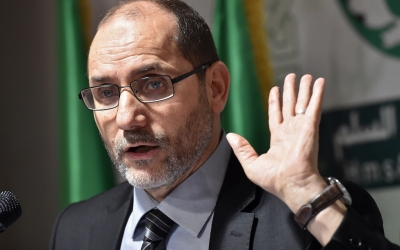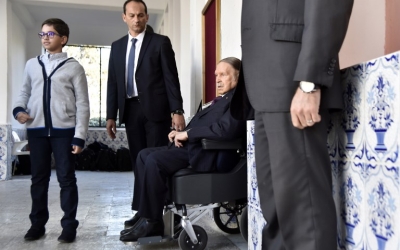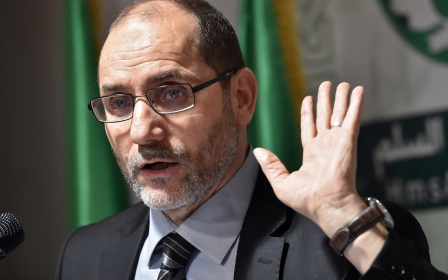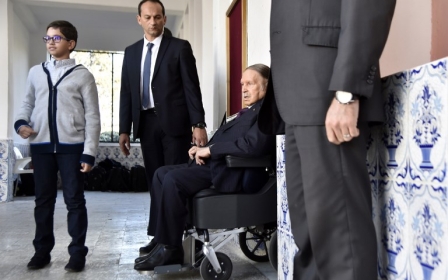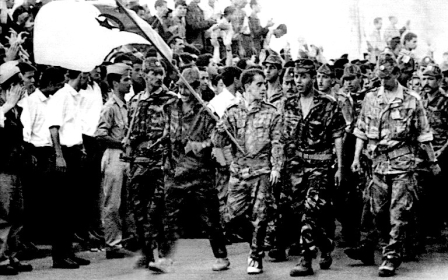Algeria's ruling party backs ailing President Bouteflika for fifth term
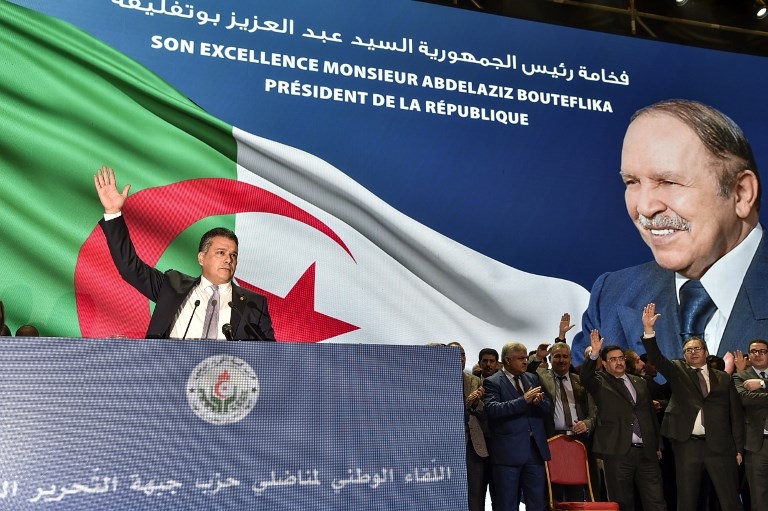
Algeria's ruling National Liberation Front said on Saturday it had picked ailing President Abdelaziz Bouteflika as its candidate for April's election.
"The FLN has designated President Bouteflika as the party's candidate," said its coordinator, Mouad Bouchareb, using the group's French acronym. "We have chosen him because we need continuity and stability," he added.
Bouchareb spoke in front of thousands gathered in the capital Algiers for a pre-campaign meeting, AFP said.
Bouteflika, 81, who has been in office since 1999 but has been seen in public only rarely since suffering a stroke in 2013 that confined him to a wheelchair, is likely to win a fifth term as the Algerian opposition remains weak and fragmented, Reuters said.
The declaration came a week after the ruling coalition - comprised of the FLN and three other parties - backed Bouteflika for the 18 April poll.
New MEE newsletter: Jerusalem Dispatch
Sign up to get the latest insights and analysis on Israel-Palestine, alongside Turkey Unpacked and other MEE newsletters
He has yet to announce whether or not he will run in the poll, but victory at the ballot box would translate into a fifth term. Presidential candidates have until 3 March to submit their applications.
For the last presidential election in 2014, Bouteflika only declared his intention to run a few days ahead of the deadline.
Prime Minister Ahmed Ouyahia said on 2 February that there was “no doubt" the president would seek a fifth term. Ouyahia has said Bouteflika's health was not "an obstacle" to performing presidential duties.
Retired general Ali Ghediri, 64, was the first to announce his candidacy after the presidency set the election date.
Algeria's main Islamist party, the Movement for the Society of Peace, will also take part in the poll, backing its candidate Dr Abderrazak Makri.
The country's oldest opposition party, the Front of Socialist Forces, announced on 25 January that it would not field a candidate and called for an "active, intensive and peaceful boycott" of the ballot.
Bouteflika’s re-election would offer short-term stability for the elites of the FLN, the army and business tycoons, and postpone a potentially controversial succession.
But the president will need to find a way to connect with the North African country's young population, almost 70 percent of which is aged under 30.
The OPEC oil producer is a key gas supplier to Europe and a US ally in the fight against terror in the Sahel region.
Bouteflika is part of a thinning elite of the veterans who won independence from France in the 1954-62 war and have run Algeria ever since.
In December, flu meant he was unable to meet Saudi Crown Prince Mohammed bin Salman, in Algiers for a two-day visit.
His last meeting with a senior foreign official was during a visit by German Chancellor Angela Merkel on 17 September. An earlier meeting with Merkel and a meeting with Italian Prime Minister Giuseppe Conte were both cancelled.
Algeria avoided the major political upheaval seen in many other Arab states in the past decade but has experienced some protests and strikes. Unemployment remains high, especially among young people, many of whom have left the country to seek better wages and living conditions.
The economy has improved over the past year as oil and gas revenues have picked up, allowing authorities to ease austerity measures.
Oil and gas earnings account for 60 percent of the budget and 94 percent of export revenues. But Bouteflika remains popular with many Algerians, who credit him with ending the country's long civil war by offering former Islamist fighters amnesty.
Supporters say his mind remains sharp, even though he needs a microphone to speak. The opposition says he is not fit to run again and several candidates, including a retired general, have said they will challenge Bouteflika.
The government has said it wants to diversify the economy away from oil and gas, but there has been resistance from those within the ruling elite to opening up to foreign investment.
That has left the economy dominated by the state and firms run by business tycoons.
Middle East Eye delivers independent and unrivalled coverage and analysis of the Middle East, North Africa and beyond. To learn more about republishing this content and the associated fees, please fill out this form. More about MEE can be found here.


